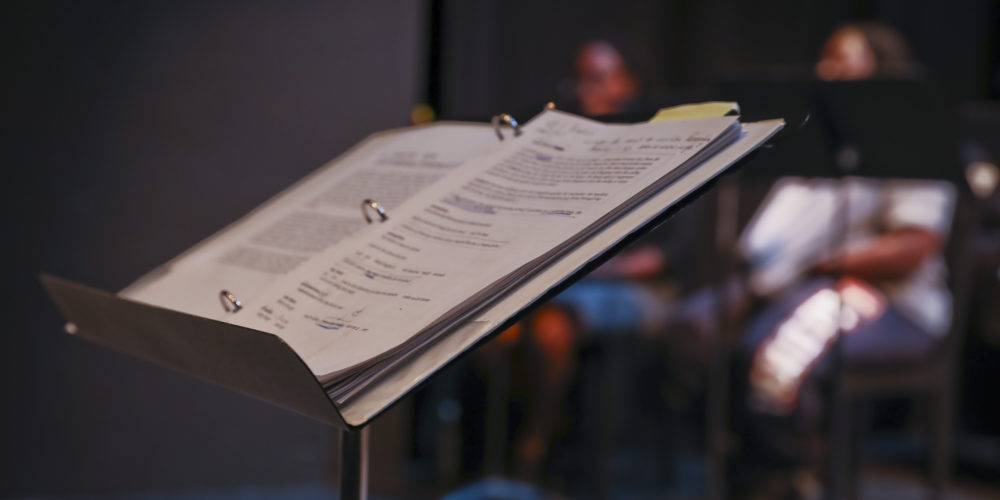10 Jul Stefani Kuo(郭佳怡) Artist Talk

What does the day-to-day process of playwriting look like for you personally?
Writing is really hard for me! I love it but it can be absolutely torturous. I’ve never been one to either have a rigid schedule (like Murakami) or to write based only when I feel inspired. As I’ve learned and come to believe, waiting for inspiration isn’t what makes me a writer –– the discipline of writing on a daily or regular basis is what makes me a writer. And I really believe in that. There are certain things I need to do to feel good about writing – it doesn’t have to be before I write, necessarily, but having things like exercise scheduled into my day help me feel regulated physically and emotionally, which helps me write. I like to commit at least 2-3 hours a day, usually in the morning or afternoon, to writing. (I’ve tried to commit 8-9 hour chunks to writing which is a nightmare because I run out of steam. Longer chunks of time tend to work best if I’m editing/revising, as opposed to creating.) As a multi-genre writer, I usually focus on one project at a time. These days, I’m working on a long form poem that I’m collaborating with a composer with to turn into a musical piece. But I tend to view the hours I commit to writing each day in a much broader sense –– the hours may be used to write pages and pages, or they can also involve reading, thinking, journalling, running to the kitchen for snacks every fifteen minutes, or stretching while doing it. I don’t wait for inspiration but I also don’t believe in forcing “productivity” when it comes to my writing.
What was it about the environment of the play that inspired you to have the story take place there in particular?
This might be a no-brainer, but I was born and raised in Hong Kong, so Hong Kong is home for me. I’ve never written a play set in Hong Kong (I’m only realizing this now), and I decided to after a series of events. First, of course, the protests that began in June 2019 –– I was following the protests very closely and a friend of mine asked me one day if I was writing a play about the protests. I said I wasn’t –– why would I want to capitalize on my city’s pain? But then he said, “if you don’t, some white British guy who has no idea what Hong Kong is like will, you’ll try to defend yourself but have no play to do it with.” And that’s when I realized I had the voice and responsibility to tell a (not the) story about Hong Kong because it’s important to me and to our world.
What is it about playwriting that you feel effectively told the story you wanted to tell, especially over other forms of storytelling?
I spent a lot of time mulling over “why a play” when it comes to the Hong Kong protests. I think this is true of a lot of immediate and political topics, but I wasn’t entirely convinced that I should write a play that would –– in the American theatre –– be likely seen and produced years after the fact, when I could be protesting on the streets or writing journalism or performing more immediate activism. What I realised, however, is that plays tell stories that look not at the immediate political situation, but the way that the environment affects the people within it, and who are living in it. I realised, pretty quickly, that people who are steeped in such a political climate, don’t talk about what’s going on. In fact, talking about politics is the last thing that they want, especially when they live, breathe, eat, and dream about it. They just want to eat their meals, see their movies, go on their jogs or bike rides, or make ends meet. And this is what a play about people can do –– it can tell the story of the people living in the day to day life, rather than focus on the political upheaval and agenda that people in the city or situation are inundated with and which people outside of the city/country only see as turmoil and not as a situation that affects people just like themselves.
Is there any message or anything in particular, that you want the audience to take away from your play?
I don’t think there’s a particular message I want the audience to take away. In fact, I think I want the opposite. The news, in my opinion, and media in general is so skewed and tells such a specific story that inevitably plants a specific type of message in the reader or viewer’s mind. This is what’s happened with a lot of the news about Hong Kong, especially because the news is so western-centric, especially in America, the story that has been told and is being told about Hong Kong is so pointed and also muddled. I hope that the audience, in seeing this play, will come to understand a bit more about Hong Kong – not the protests necessarily but the culture, the nuances, the tensions, the language(s), the people, and what’s at the core of it all. I hope people will see that these people are just people, these are families, loved ones, people struggling with the same daily things that many of us are. And I hope the audience goes away with more questions than answers – about how they are connected to Hong Kong, through the American economy, or their own understanding of the politics on this side of the world. I hope the audience will go home and have discussions about it, or look things up on their own, and maybe see the intersectional parts of what’s happening here with the rest of the world and their own homes.
When writing your play did you imagine a certain audience that you were writing for? If so, how do you think this affected your writing process and the writing itself?
This is a huge question for me! As an artist who identifies as Asian in America (as opposed to Asian American), I often grapple with how to bring stories from Asia to the west, and why I do it. In writing and workshopping this play, I’ve come to see that this is a play not meant necessarily for America, or even the west, but for a non-Hong Kong audience. Hong Kong doesn’t necessarily need this play – everyone here is living in the households that this play tries to take apart, and everyone understands most of the context within the play. But at first, because I began writing the play in the U.S., I felt compelled to make a lot more of the scenes and dialogue English than I actually wanted to. I think this is a huge piece of the work I want to create and how I think some of my work is changing. I’m a multilingual artist and for so long I’ve suppressed the desire to write in other languages, not because it’s not good or wrong, but because I am worried it won’t be considered “American enough.”And when it came to this play, that was a much more complicated question. Because this isn’t an American play! It’s not an immigrant story in America, it’s not even set in America at all. But I think it’s an important play to do in the American theatre now, because it talks about America’s global impact and the relationship between Hong Kong and America (and China). And that story is global and multilingual, so this play is too. And I’m hoping that the audience that sees it will be open to that
Are there any contemporary plays that inspire you as a playwright and/or gave you that push to begin and continue writing your play?
In working on more multilingual and global plays, I’m continually finding inspiration in other writers who are doing it too –– there weren’t many when I started writing or when I started going to school in the U.S., but there are more and more!! I’m a huge admirer of Anchuli Felicia King’s work – I saw a reading of one of her plays, Golden Shield, as I was working on one of my other plays, China Dreams or the Conservation of Parity, which is written in Mandarin, Japanese, and English, and was so inspired and affirmed in being able to write in multiple languages and touch audiences in the U.S. And it allowed me to write this play too. And of course, not a playwright, but Bong Joon Ho and his movie Parasite – and also his other films – along with more shows in TV/film like Unorthodox have made room for more multicultural stories or the feeling that artists like myself have room to do it. I will be honest and say that I think the American Theatre is lagging in this respect, but it’s something that I think will keep changing and hopefully in that direction, because it’s important.
What do you hope to see in future plays and theatre companies with regards to the way they explore language and the way their stories are told?
There are two levels on which I approach this question –– the first is very simple: languages are amazing and we should make room for more of them!!! But on a more nuanced level, I think that while companies have been increasingly more open to doing plays written in more language than one, the environment created by these companies don’t necessarily support multilingual/multicultural work. A lot of the time, that only comes out after the process has begun. When a play is first accepted or is a finalist or the playwright is being interviewed for a production or opportunity, companies often are incredibly excited at the prospect of doing such a multicultural play, but not many companies have the ability to actually support the piece. This comes in the form of casting, creating a diverse (in terms of race, gender, and also linguistic ability, cultural background, etc.) artistic room and understanding the needs of the piece. Oftentimes the blockades come when casting directors or directors mention “casting this will be hard…”even though as multilingual artists, we know that if we exist, then the actors do too. And that goes for directors, dramaturgs, designers, etc. It’s not hard – it’s different from what most companies have been founded on and what the “norm” used to be. I hope that theatre companies not only open their spaces for more multicultural work, but also find space to support the work in the same thoughtful and intentional way that it does monolingual work and American-centric pieces.
Get tickets to Final Boarding Call and the other BAPF2020 plays.
Stefani Kuo (郭佳怡) is a playwright/performer and native of Hong Kong and Taiwan. She received her B.A. from Yale and is an MFA Playwriting Candidate at the Yale School of Drama. She has been an awardee of the Jerome Fellowship at PWC, finalist for the National Playwrights Conference, Jerome fellowship at Lanesboro Arts Centre, Many Voices Fellowship at PWC, SPACE on Ryder Farm, Van Lier New Voices Fellowship, NAP Series, DVRF Playwrights’ Program, semi-finalist for the Page 73 Playwriting Fellowship, Princess Grace Fellowship, Ground Floor at Berkeley Rep. Her play, Architecture of Rain, premiered at the Iseman Theatre at Yale and received a reading in the DVRF Roundtable and Checkmark Theatre Company series. She was commissioned to write a play for the Rubin Museum’s Spiral Magazine, and is currently commissioned to write a play for Roundhouse Theater Company. Her play delicacy of a puffin heart was produced with the 2018 Corkscrew Theatre Festival and The Parsnip Ship. As a performer, she was most recently seen in Bedlam’s production of King Lear. She is represented as a playwright by Kevin Lin at CAA and Jacob Epstein at Lighthouse Management. www.stefanikuo.com (For more on Hong Kong).
About Final Boarding Call: Final Boarding Call tells the human stories of the current Hong Kong protests revolving around seven interconnected characters whose backgrounds and perspectives run the spectrum. A protesting brother and flight attendant sister struggling to stay safe while fighting for what they believe in; a Mainland Chinese mother seeking forgiveness from her Hong Kong reporter daughter for previous wrongs and judgements of her Indian husband; and an American expat CEO and Hong Kong lover living in the shadows. We see a window into China’s grip on global capitalism, but most importantly, we see how the politics on the news every day affects the citizens of Hong Kong and their day to day lives.



No Comments